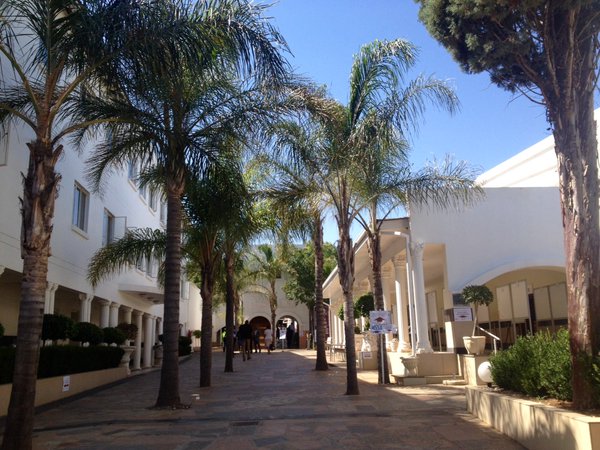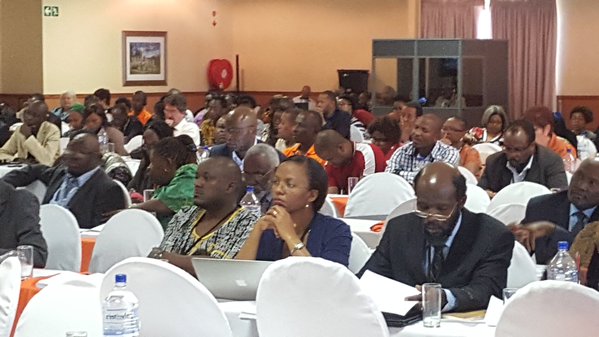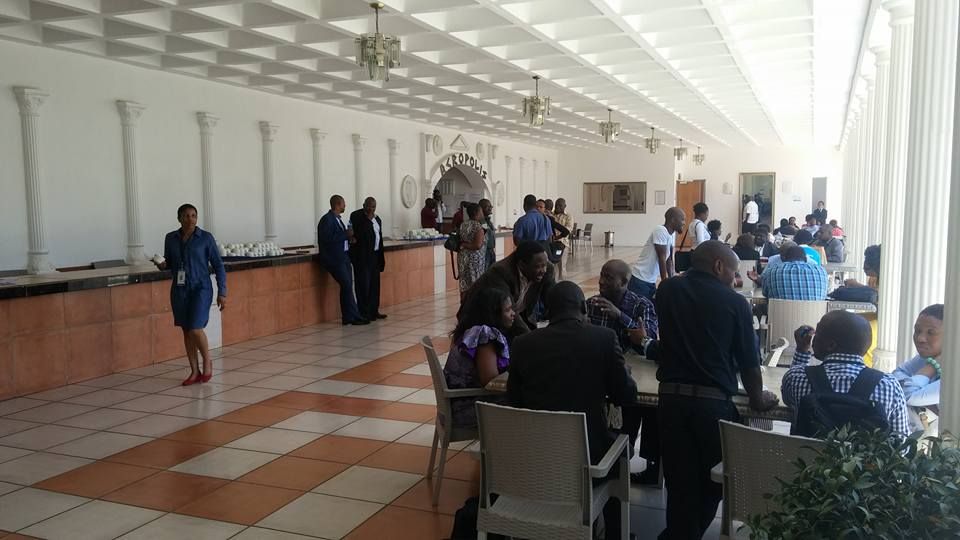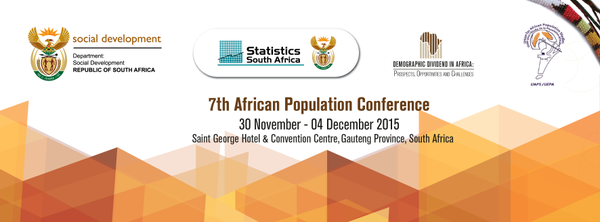
7th African Population ConferencePretoria, South Africa, 30 November-4 December 2015
The 7th African Population Conference took place in Pretoria, South Africa from 30 November to 4 December 2015 at the St. George Hotel and Conference Centre. Organized by the Union for African Population Studies (UAPS) in collaboration with the South Africa Department of Social Development, the overarching theme of the Conference was the Demographic Dividend in Africa: Prospects, Opportunities and Challenges. Despite a late change in venue to Pretoria from the University of Witwatersrand, in Johannesburg, the Conference organizers managed a successful conference that brought together approximately 800 participants from 58 countries and included 161 scientific sessions and 4 poster sessions. The Minister of Social Development , Mrs. Bathabile Dlamini gave the welcome address at the opening ceremony which also included remarks from the Statistician General of Statistics South Africa, Mr. Pali Lehohla, and Rachel Snow, director of the UNFPA’s Population and Development Branch as well as the Presidential address of UAPS President, Jean-François Kobiane.
In his opening ceremony address, the President of UAPS reminded the audience that by 2050 Africa is projected to be home to a quarter of the world’s population. One third of the population will be between 15 and 30 years of age. It will be an enormous challenge to educate them, provide for their health care and employment, but at the same time it is an enormous opportunity for economic development, thanks to a favorable ratio of active adults to dependent members of the population. Africa must make an effort to capture the potential dividend this demographic window of opportunity offers by making the necessary investments in education, health care, family planning, and job creation.
The question of the demographic dividend was the core topic of sessions in the theme Population and Development but it was also touched on in many other sessions over the 5 days of the Conference that focused on other aspects of African demography such as the fertility transition, adult health, the consequences of urbanization, population and climate change, and many others topics (to see the complete programme go to http://uaps2015.princeton.edu/).
After five days of intense discussions and debates, the participants unanimously approved the 7th African Population Conference Tshwane Declaration at the Closing Ceremony. The declaration exhorts African governments and institutions to implement the global and regional consensus on population and development, invest in the demographic dividend by investing in quality education, health care, skills development and employment for Africa’s youth, support policies that ensure reproductive and sexual health rights, and mobilize Africa’s resources to reduce dependence on foreign aid and staunch the flight of resources from Africa.
The Closing Ceremony on Friday 4 December, chaired by Jacques Van Zuydam, officially ended the conference. UAPS President Jean-Francois Kobiane handed over the office to Vice President Samuel Kodjoe who introduced the new officers and council members elected on Thursday 3 December. They include: Donatien Beguy (Chad), Vice-President; Dela Kusi-Appouh (Ghana), Treasurer; Thandie Hlabana (Lesotho), General Secretary; Yovani Moses Lubaale (Uganda), East Africa Representative; Jacques Emina (Congo, D.R.), Central Africa Representative; Mohammed Bedrouni (Algeria), Northern Africa Representative; Abdramane Soura (Burkina Faso), West Africa Representative; and Léon Swartz (South Africa), Southern Africa Representative.
Pali Lehohla, Statistician General, in his closing ceremony remarks, laid out the road to Cape Town 2017, inviting all present to come to South Africa to attend the IUSSP International Population Conference. IUSSP President Anastasia Gage was invited to address the delegates. In her closing remarks, she thanked UAPS and the South African hosts for organizing the African Population Conference, and gave those present 7 reasons why they should return to South Africa again in 2017 to attend the 28th International Population Conference.
IUSSP at the African Population Conference
The IUSSP organized a round table panel session on “Advancing the Data Revolution: A dialogue between Demographers and Data Practitioners” which attracted over 100 participants. The IUSSP Scientific Panel on the Demographic Causes and Consequences of Ebola and other Emerging Infectious Diseases organized a session at the Conference on “Measuring and monitoring the Ebola outbreak in Africa”. The IUSSP Scientific Panel on Innovations for Strengthening Civil Registration and Vital Statistical Systems held a meeting in Johannesburg just before the Conference on Lessons learned from local initiatives supporting sustainable civil registration and vital statistics (CRVS) systems in Africa. The Network for Strengthening Demographic Training in Francophone Africa (FraNet) held two closed side meetings before and after the conference.
The Latin American Population Association’s Vice President, Juan José Calvo (University of Uruguay) also spent some time at the IUSSP stand to present the forthcoming Latin American Population Conference that will take place in Foz do Iguacu, Brazil 17-21 October 2016.
The Conference was an excellent opportunity to work on preparations for the International Population Conference, which will take place in Cape Town from 29 October to 4 November 2017. The steering committee meeting for the 2017 Conference took place just before African Population Conference where a number of organizational matters were discussed. |
|



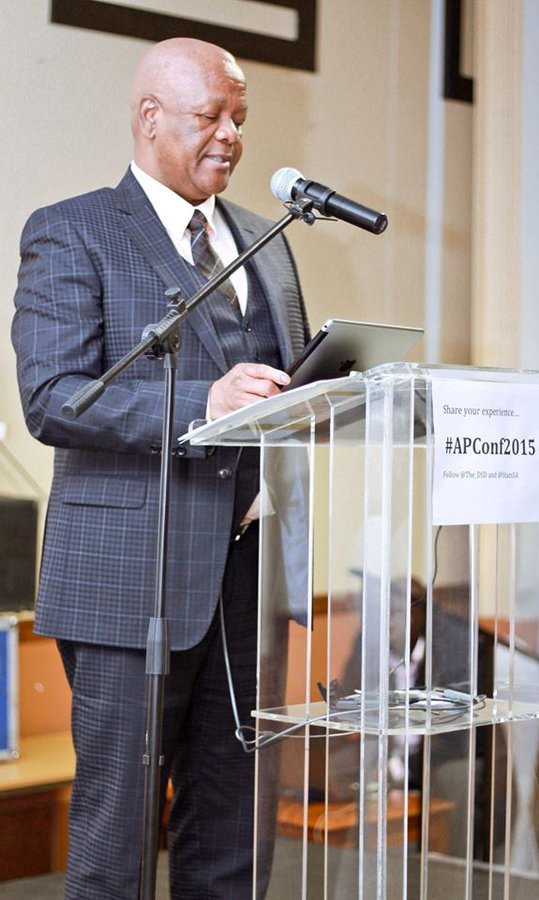 Honorable Minister in the Presidency, South Africa, Jeffrey T. Radebe gave a key note address at the Closing Ceremony that drew on demographic data underlining the important role of population research in planning for Africa’s future. He affirmed the importance of guaranteeing access to family planning and reproductive health and investing in the education and job skills of Africa’s youth to assure a better future for Africa. He noted the important role African intellectuals and scientists such as those attending the Conference have to play in forging an African path to development. He looked forward to hearing more from population researchers when South Africa hosts the 28th International Population Conference in Cape Town in 2017.
Honorable Minister in the Presidency, South Africa, Jeffrey T. Radebe gave a key note address at the Closing Ceremony that drew on demographic data underlining the important role of population research in planning for Africa’s future. He affirmed the importance of guaranteeing access to family planning and reproductive health and investing in the education and job skills of Africa’s youth to assure a better future for Africa. He noted the important role African intellectuals and scientists such as those attending the Conference have to play in forging an African path to development. He looked forward to hearing more from population researchers when South Africa hosts the 28th International Population Conference in Cape Town in 2017.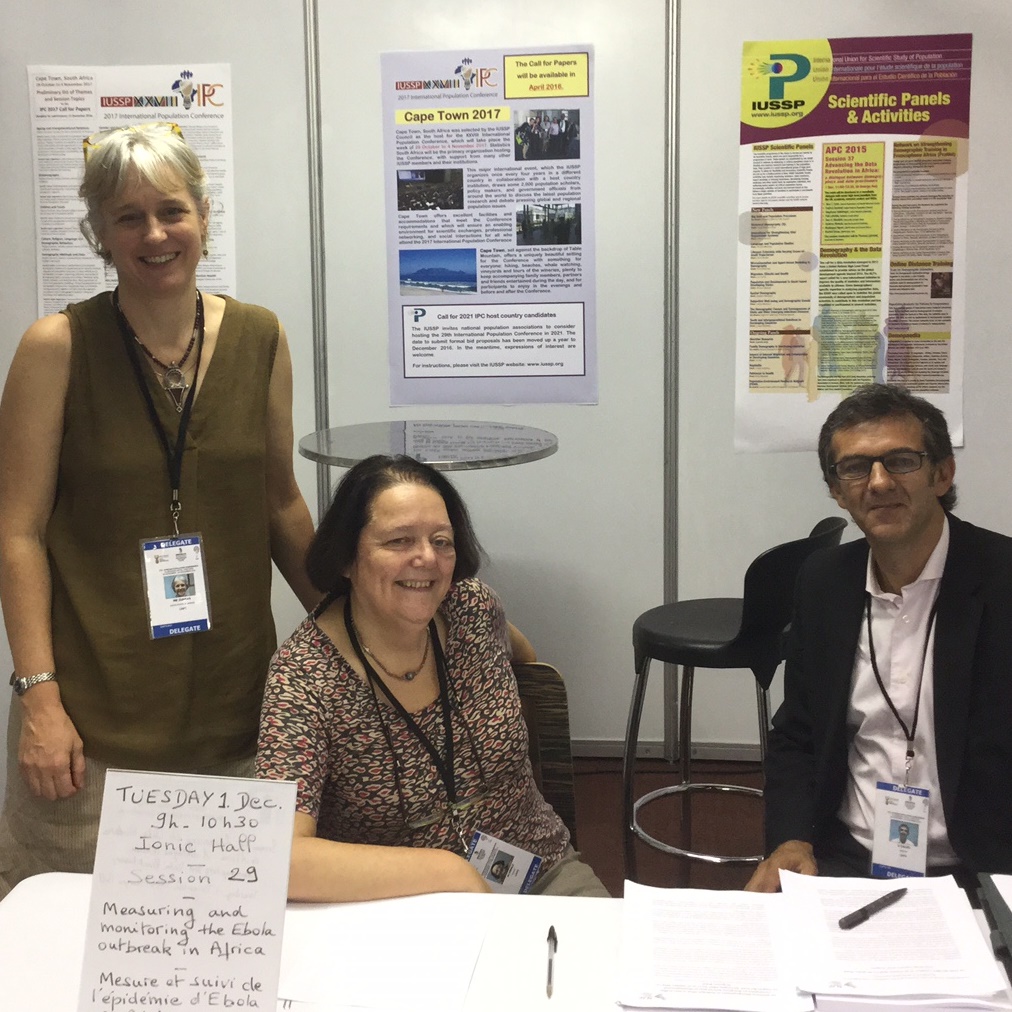 The IUSSP exhibit stand received many visitors who came to renew their membership and learn about IUSSP activities; over 50 delegates joined or renewed their membership. All were interested in hearing about the 2017 International Population Conference in Cape Town. A poster with a preliminary list of themes, sessions and organizers was on display in anticipation of the Call for Papers that will go out in March 2016.
The IUSSP exhibit stand received many visitors who came to renew their membership and learn about IUSSP activities; over 50 delegates joined or renewed their membership. All were interested in hearing about the 2017 International Population Conference in Cape Town. A poster with a preliminary list of themes, sessions and organizers was on display in anticipation of the Call for Papers that will go out in March 2016. 